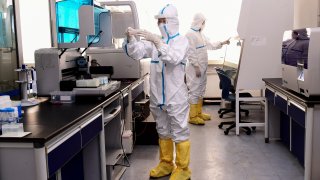
Human trials for a potential vaccine to prevent COVID-19 could begin “within a few weeks” with a vaccine ready for public use within the next 12 to 18 months, a top U.S. health official said Thursday.
“We said ... that it would take two to three months to have it in the first human,” Dr. Anthony Fauci, director of the National Institute of Allergy and Infectious Diseases, told the House Oversight and Reform Committee on Thursday at a hearing on the nation’s preparedness for the outbreak.
“I think we’re going to do better than that,” he said. “I would hope within a few weeks we may be able to make an announcement to you all that we’ve given the first shot to the first person.”
The National Institutes of Health has been working with biotech company Moderna to develop a vaccine using the current strain of the coronavirus.
Fauci has said the potential vaccine contains genetic material called messenger RNA, or mRNA, that was produced in a lab. The mRNA is a genetic code that tells cells how to make a protein and was found in the outer coat of the new coronavirus, according to researchers at the Kaiser Permanente Washington Health Research Institute.
The mRNA instructs the body’s own cellular mechanisms for making proteins to make those that mimic the virus proteins, thereby producing an immune response.
U.S. & World
“I want to make sure people understand, and I’ve said that over and over again, that does not mean we have a vaccine that we can use,” Fauci cautioned. “We mean it’s record time to get it tested. It’s going to take a year to a year and a half to really know if it works.”
There are currently no proven therapies for the latest outbreak, which has killed at least 4,717 and sickened more than 127,000 people worldwide since emerging from the Chinese city of Wuhan a little over two months ago.
Hopes to get a vaccine to market are high, but doctors want expectations to be low for how quickly it can happen. Developing, testing and reviewing any potential vaccine is a long, complex and expensive endeavor that could take months or even years, global health experts say. Before researchers can begin human trials, they must have a firm understanding of the pathogen, run safety tests and find enough human volunteers.
Fauci told reporters last month a vaccine may not solve “problems in the next couple of months but it certainly would be an important tool that we would have.” He said it’s possible the virus will prove to be seasonal, thus likely to subside in the warmer months like the flu.
Fauci said Thursday that health officials say “it will take a year to year and half to really know if it works.”
In the meantime, some health authorities are using Gilead Sciences’ antiviral drug Remdesivir, which was tested as a possible treatment during the Ebola outbreak. CDC director Robert Redfield said at a separate hearing Tuesday that the drug is being used in Washington state, where COVID-19 cases have surged and authorities have banned mass gatherings.
This story first appeared on CNBC.com. More from CNBC:



